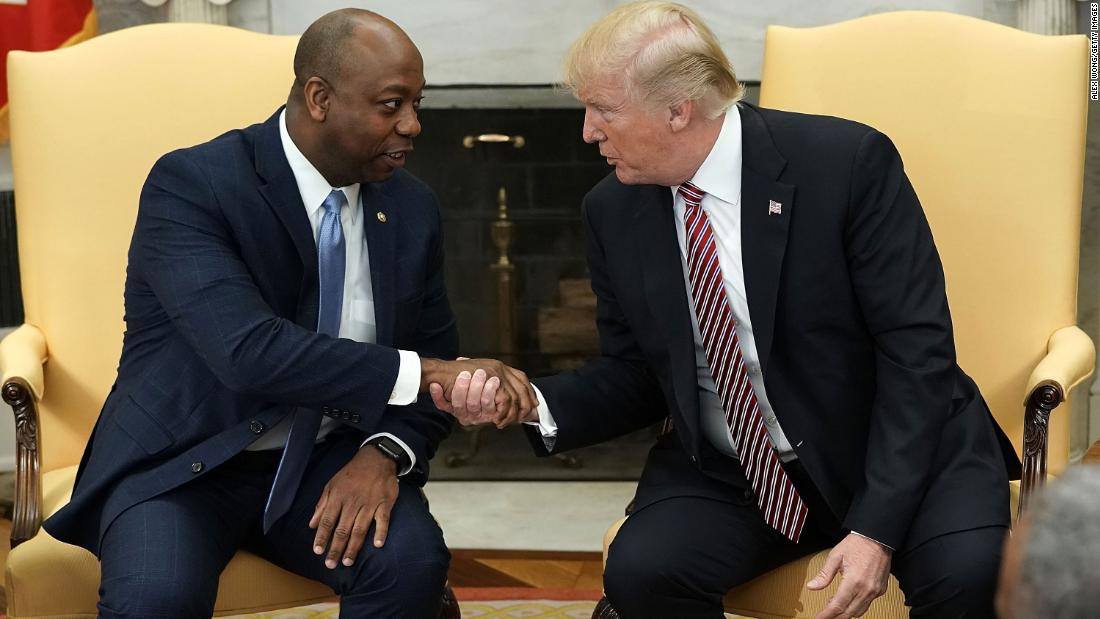
“Honored to have this opportunity,” tweeted Scott after the news broke. “I’m as confident as I’ve ever been in the promise and potential of America and look forward to sharing my vision for our nation with all of you.”
Scott, the lone Black Republican in the Senate, has been viewed as a rising star within the party since he won a House seat in 2010, beating the son of the late South Carolina Sen. Strom Thurmond (R) in the GOP primary. Three years later, Scott was appointed to the Senate by then-South Carolina Gov. Nikki Haley following the resignation of Jim DeMint (R).
Since then, Scott has cut an interesting path in the GOP — particularly in the four years of Donald Trump’s presidency. While Scott has generally compiled a consistently conservative voting record — he has an 85% lifetime voting score from the conservative Heritage Action group and an 86% lifetime score with the Club for Growth — he’s also bucked his party (and his President) on key issues, mostly surrounding race.
“Once President Trump was elected, Scott began separating himself from his party by opposing many of Trump’s judicial and administration nominees, often raising comments about past statements or actions on race,” reads the Almanac of American Politics about the South Carolina Republican.
In the wake of Trump’s comments that there were “some very fine people on both sides” of the white nationalist violence in Charlottesville, Virginia, in 2017, Scott blasted the then-President. “Racism is real. It is alive,” Scott said, adding: “What we want to see from our President is clarity and moral authority. And that moral authority is compromised. … There’s no question about that.” A month after Charlottesville, Scott met with Trump one-on-one in the White House.
But while Scott has not been as reflexively loyal to Trump as many of his Senate (and House) colleagues, he’s remained on the former President’s good side. He endorsed Trump’s reelection bid and spoke at the Republican National Convention in 2020. And he defended Trump following the January 6 insurrection at the US Capitol; “The Democrats should put the blame where it stands, where it should be,” Scott said in a Fox News interview in February. “And it does not have to do with the President, who said go ‘peacefully’ to protest.”
That careful balancing act has made Scott something of a rarity in Republican politics these days: Someone liked by the Trump base and by the party establishment. (Haley may be Scott’s biggest competition for that role in the party at the moment.)
And the nation’s continued focus on race and policing — punctuated by the protests in the summer of 2020 and this week’s guilty verdict of former Minneapolis police officer Derek Chauvin for the murder of George Floyd — has made Scott’s voice an essential one for the GOP as it tries to expand its appeal beyond white voters.
Scott is in the middle of negotiations over a bipartisan compromise on policing legislation in the wake of Chauvin’s conviction. Those talks took a more optimistic turn this week after Scott proposed that police departments — as opposed to individual police officers — could be sued by victims’ families, an issue known as “qualified immunity.”
If Scott could find a way to negotiate a bipartisan compromise on such a hot-button issue — and show he has the ability to deliver GOP votes for the proposal, it would be a major feather in his cap. “I assume my conference understands where I am, and I’m hopeful and optimistic” that they would back a compromise on policing reform, Scott said Wednesday. He also said that the talks were “on the verge of wrapping soon.”
Scott will, undoubtedly, talk about his work on that legislation during his speech Wednesday night. And as he did in his 2020 GOP convention speech, Scott will tell a life story that doesn’t fit with the traditional Republican caricature. Here’s a key bit from that speech:
“My parents divorced when I was 7 years old. We lived in a two bedroom house with my grandparents, … me, my mom and my brother sharing a room and a bed. My mom worked 16 hours a day to keep food on the table and a roof over our heads.
“She knew that if we could find the opportunity, bigger things would come.
“I thought I had to use football to succeed in life, … and my focus on academics faded away. I failed my freshman year of high school — four subjects, … Spanish, English, world geography and civics.
“Trust me, after spending seven years in the Senate, I know I’m not the only one in Congress who failed civics.
But even while I was failing the 9th grade, … my mother always said, ‘When you shoot for the moon, even if you miss, you will be among the stars.’ She never lost faith in me, even when I lost faith in myself. Because of her encouragement, I went to summer school and caught up.”
Powerful, right? And Scott has charisma to spare — as people unfamiliar with him will see come Wednesday.
Scott — not for nothing — also hails from South Carolina, a critical state in the early presidential primary process. And he’s shown he can raise money; ending the first quarter of the year with almost $9 million in the bank.
Republicans looking for the post-Trump future for their party — and not every Republican is looking to move on from Trump — would do well to look closely at Scott.
For his part, Scott has long used the same joke when asked about whether he will run for president: “I’m not even running for president of my homeowners’ association.” After Wednesday night, it’s going to get a lot harder for him to get away with that answer.



